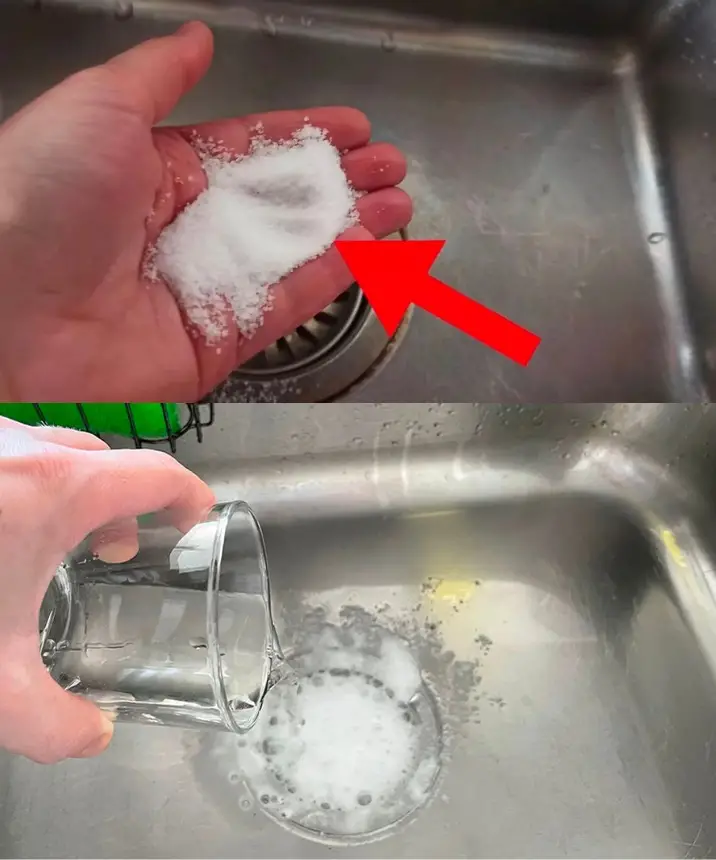Keeping your sink drain clean and free from blockages is essential for maintaining a healthy, functioning kitchen or bathroom. Clogged drains can cause slow drainage, unpleasant odors, and even damage to your plumbing system if left untreated. While commercial drain cleaners may seem like a quick fix, they often contain harsh chemicals that can harm your pipes and the environment. Fortunately, there is a natural, effective, and budget-friendly solution to unclog drains fast using simple household ingredients: baking soda and vinegar.
This guide will walk you through easy preventive steps to avoid blockages and a quick, powerful method to clear a clogged sink drain naturally in just minutes. Along the way, you’ll find tips to maintain your drains and FAQs to answer common concerns.
Preventing Sink Drain Blockages
Before tackling a clogged drain, it’s important to understand how to prevent blockages from happening in the first place. Here are some practical steps to keep your drains flowing freely:
Remove Food Residues Before Washing
One of the most common causes of clogged drains is food particles that enter the plumbing system. Always scrape off leftover food from dishes, pots, and pans into the trash or compost bin before washing. This simple habit stops food debris from accumulating inside the drainpipes.
Avoid Pouring Oil and Grease Down the Drain
Cooking oils and grease can solidify inside pipes as they cool, leading to stubborn blockages over time. Instead of pouring oil down the drain, collect it in a container and dispose of it with your household hazardous waste or recycle it if possible. This step protects your plumbing and helps the environment.
Do Not Pour Chemicals Down the Drain
Certain chemicals like paint, disinfectants, and other oily substances should never be poured down the drain. These substances can create greasy buildups and damage your plumbing. Properly dispose of these chemicals at designated collection centers.
Natural Method to Unclog a Drain Using Baking Soda and Vinegar
If you encounter a clogged sink drain, here is a fast and eco-friendly way to clear it using ingredients you likely already have at home. This method works by creating a fizzy chemical reaction that helps dissolve blockages and freshens your drain.
Step 1: Pour Baking Soda Into the Drain
Begin by measuring out ½ cup (about 150 grams) of baking soda. Pour the baking soda directly into the drain opening, ensuring it goes down the pipe rather than spilling on the sink surface. Baking soda acts as a gentle abrasive and deodorizer.
Step 2: Add Vinegar to the Drain
Next, measure 1 cup (approximately 200 ml) of white vinegar. Slowly pour the vinegar into the drain over the baking soda. Almost immediately, you will notice a fizzy, effervescent reaction. This bubbling helps break down grease, food particles, and other grime clogging your pipes.
Step 3: Let the Mixture Sit and React
Allow the baking soda and vinegar mixture to sit in the drain for about 30 minutes. During this time, the fizzing action continues to work on dissolving the blockage and neutralizing odors.
Step 4: Clean the Sink Surface
While waiting, take a damp sponge and use the vinegar-baking soda mixture that may have overflowed on the sink surface to scrub and polish the sink. This step gives your sink a clean shine and helps remove stains.
Step 5: Flush the Drain With Hot Water
After 30 minutes have passed, boil or heat a kettle of water. Carefully pour a generous amount of hot water down the drain. The hot water flushes away the loosened debris and clears the pipes, restoring free flow.
Additional Tips for Maintaining Clean Drains
- Use a Drain Strainer: Installing a small strainer over your sink drain can catch food particles and prevent them from entering the pipes.
- Regular Cleaning: Repeat the baking soda and vinegar treatment monthly as a preventive measure to keep drains fresh and clear.
- Avoid Harsh Chemicals: Limit the use of chemical drain cleaners, which can damage your plumbing and contaminate the environment.
- Flush With Hot Water Weekly: Pouring hot water down the drain weekly helps dissolve minor grease buildup before it becomes a problem.
- Act Quickly: Address slow drains early before they turn into full clogs.
Frequently Asked Questions
Is baking soda and vinegar safe for all types of pipes?
Yes, baking soda and vinegar are safe for metal, PVC, and other common plumbing materials. They do not cause corrosion like harsh chemical cleaners.
How often should I use this method to keep drains clear?
Using this method once a month as maintenance is usually enough to prevent buildup and odors.
Can this method unclog severe drain blockages?
This natural method works well for minor to moderate clogs caused by grease, soap scum, and food residue. For severe blockages, professional plumbing may be necessary.
What if the drain is still clogged after this treatment?
Try repeating the process once more. If the clog persists, use a plunger or drain snake. Persistent issues may require a plumber’s inspection.
Can I use hot tap water instead of boiling water to flush the drain?
Boiling or very hot water is more effective in dissolving grease and flushing away debris. Hot tap water may not be hot enough.
Is it safe to pour vinegar and baking soda down the drain frequently?
Yes, the ingredients are natural and safe for pipes and septic systems when used properly.
Conclusion
Keeping your sink drain clean doesn’t have to be complicated or expensive. By practicing simple prevention techniques and using the natural baking soda and vinegar method, you can quickly clear minor clogs and maintain a fresh-smelling, smoothly draining sink. This eco-friendly solution avoids harsh chemicals, saves money, and is easy enough for anyone to do.

